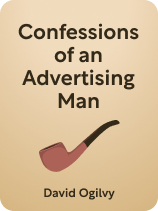

This article is an excerpt from the Shortform book guide to "Confessions of an Advertising Man" by David Ogilvy. Shortform has the world's best summaries and analyses of books you should be reading.
Like this article? Sign up for a free trial here.
What does it take to climb the corporate ladder in advertising? How can you stand out from your peers without making enemies along the way?
David Ogilvy’s marketing career advice is invaluable to ambitious professionals aiming to advance in advertising agencies. His guidance in his book Confessions of an Advertising Man combines practical strategies for excelling at work while navigating office politics and relationships with colleagues.
Keep reading to learn how you can position yourself for success by following Ogilvy’s time-tested principles, along with modern perspectives on career advancement.
Marketing Career Advice
In his book, Ogilvy provides marketing career advice to up-and-coming employees who want to rise through the ranks at an agency. He contends that the way to earn a promotion is to work harder and create more ads than any of your peers. By being the best—putting in the extra hours, honing your skills, and demonstrating all-around superior performance—you can attract the attention of executives looking for the next advertising prodigy. Managers are always looking for the most promising individuals because they understand that standout ads are almost always the brainchild of a single advertiser, not a team.
That said, don’t make it obvious to your peers that you’re primarily focusing on impressing managers. If your coworkers perceive you as an adversary, they may sabotage your chances of promotion. Maintain cordial relationships, but stay focused on your work as an individual.
(Shortform note: In The 48 Laws of Power, Robert Greene argues that you can persuade others to help you by convincing them that doing so would benefit them. By this logic, you could turn coworkers from adversaries into allies by showing them how your promotion would help the entire team. For example, if you negotiated with a manager to get one of your coworkers a more flexible work schedule, they would trust you to continue prioritizing their needs if you got promoted to a management role. If your manager ever asked for their opinion of you, they would enthusiastically recommend you for a promotion.)
If you want to attract managers’ attention by putting in extra hours at work, how should you spend them? Ogilvy recommends researching your clients’ products and industries more than anyone else—even your bosses. The more you understand about the product you’re advertising, the more persuasive and effective your campaigns will be.
Last, Ogilvy encourages honesty and transparency, even when you make a mistake. Owning up to your errors can help you earn respect and trust from your coworkers and clients, further distinguishing you as an exceptional employee who should be promoted.
(Shortform note: In Extreme Ownership, Jocko Willink and Leif Babin take this idea further, arguing that the best team members take responsibility for the mistakes of others. For instance, if someone on your team loses the files for an important client presentation your team has been preparing for, you might say to a manager, “My bad, I should have made sure everything was uploaded to the cloud.” This shows that you’re committed to doing everything within your power to achieve the team’s mission—an attitude that’s sure to earn you respect, trust, and hopefully a promotion.)
| Tailor Your Work to Your Managers Although working hard, honing your skills, and deeply understanding your clients will make it more likely you’ll earn a promotion, some argue that these traditional merit-based distinctions aren’t enough. To truly accelerate your career, you also need to strategically adapt to the unique politics of your organization. Ogilvy asserts that managers are on the lookout for individuals with the most potential. However, every manager assesses that potential in different ways. To maximize your chances of promotion, tailor your work to the managers you’re trying to impress and make it as visible to them as possible. To do this, first identify the managers who decide which workers get promoted. Then, analyze each of their behaviors, priorities, and values. Read through any public content they’ve written, talk to colleagues who know them, and (if possible) directly ask them about their goals and what success looks like to them. Once you know what your managers believe leads to success, do everything you can to demonstrate your value in those areas. For instance, if your manager is looking for ways to stay on the cutting edge of your industry, spend time brainstorming new ways to use technology that you can suggest in your next meeting. |
Exercise
Ogilvy repeatedly suggests working harder than anyone else. Do you agree that simply putting in extra effort would help you reach your current career goals? If so, what’s an additional productive task you can accomplish on your next workday? If not, why not?
Ogilvy argues that standout ads are usually the result of a single marketer’s efforts rather than team collaboration. Would you say it’s true in your workplace that the best results are typically the result of one person’s efforts? Why or why not?

———End of Preview———
Like what you just read? Read the rest of the world's best book summary and analysis of David Ogilvy's "Confessions of an Advertising Man" at Shortform.
Here's what you'll find in our full Confessions of an Advertising Man summary:
- Advice from the “Father of Advertising” on how to build a successful advertising career
- How to capture consumers' attention in an increasingly crowded marketplace
- Why you should always prepare a backup campaign when working with clients






